Quote:
Originally Posted by Professor Echo

I’ve narrowed my Sale list to four blind buys. Anyone have an opinion on any of the following titles:
HAPPY EVER AFTER
THE LEAGUE OF GENTLEMEN
MYSTERY JUNCTION
POISON PEN
|
The League of Gentlemen is a must. Poison Pen is okay, but nothing special.

A lawman bringing in a killer finds himself snowed in with a bunch of travellers, some of whom aren’t what they appear to be and at least one of whom is a killer… nope, it’s 1951 Merton Park quota quickie
Mystery Junction, with mystery writer – none of that ‘deep muck,’ just straightforward detective stories - Sidney Tafler finding out that the scream he and a little old lady who’s his biggest fan heard on a train was probably one of the cops guarding Martin Benson’s gangster being thrown off between stations. With Ewen Solon’s surviving policeman holding all the witnesses and suspects in a remote snowbound station it’s not long before there’s another dead body, the tables are turned and Benson’s calling the shots. The only problem is that if it wasn’t one of his boys who pulled the trigger, was the shot meant to save him or to kill him? And the only way to keep him under control is for Tafler to find out who’s responsible…
The inspiration is clearly Key Largo, made just three years earlier, and this doesn’t have the benefit of a powerhouse cast and an A-list writer-director, having to settle for the likes of Barbara Murray, Pat(ricia) Owens and John Salew with Michael McCarthy behind the camera and at the typewriter, but while there’s not much in the way of tension or suspense it’s still quite a pleasing little B-movie that does its job better than you have any right to expect. It’s a pleasure to hear Tafler using his natural well-spoken voice for once instead of playing his usual downmarket spivs and Benson’s a particularly convincing villain who tries to wear his paranoia lightly. Coming in at little more than an hour the material is never overstretched and the limited locations feel more of a narrative necessity than a budgetary one. It’s nothing spectacular and the film’s epilogue is sadly all-too predictable but it’s quite engaging for all that. Not seen the Blu but
Network’s DVD boasts excellent picture and sound quality. The only extra is a very brief stills gallery.
Quote:
|
I was also considering the two “FATHER” titles starring James Robertson Justice, which I didn’t see listed as part of the sale, but are appearing discounted in my basket. Are these any good?
|
Of the two I found
Father Came Too the funnier - a lot of pratfalls, but the cast is better served by the material.
Quote:
|
Any other really worthwhile titles in the sale I might have missed?
|
Of the two Tony Hancocks,
The Rebel is the funnier, with
The Punch and Judy Man being more kitchen sink bleak comic drama than comedy, while The Smallest Show on Earth, with Virginia McKenna and Bill Travers inheriting a rundown fleapit cinema staffed by Margaret Rutherford, Bernard Miles and Peter Sellers' doddery old projectionist, is a must.
 “These moors are like quicksand. They never give up their dead.”
“These moors are like quicksand. They never give up their dead.”
Much as I love
Network’s commitment to trawling the forgotten corners of British cinema, their tendency to hail half of the obscure quota quickies and minor (and sometimes downright mediocre) British studio productions of the 30s and 40s they release as forgotten classics means that when they genuinely do unearth a forgotten gem like
The Night has Eyes aka
Moonlight Madness aka
Terror House, you tend to develop such immunity to the hyperbole that you’re apt to overlook it. And this really is a low budget British film that punches well above its weight and deserves classic status. Headlined by a still up-and-coming James Mason only a year away from his breakthrough role as
The Man in Gray but already ensconced in his bitter and dangerous but irresistible to women who should know better screen persona, all too aware of the “queer fascination cruelty has,” it may be set in the early days of the Second World War but it’s a very gothic psychological thriller, albeit one that manages to make its potentially clichéd plot come up surprisingly fresh even today. And it's certainly quite a checklist of generic clichés: with an isolated house of secrets on the moors, a dangerous stretch of bog with three paths across it, only one of which is safe, a dark and stormy night, secret rooms, skeletons in the cupboard, stranded travellers and a deadly secret torment, it’s clear it’s not just the bunnies and the ‘Capucchini’ monkey it’s going to end badly for.
Joyce Howard is the plain Jane schoolteacher who decides to spend her holiday – along with obligatory wisecracking man-hungry best friend (Tucker McGuire) – on a pilgrimage to the Yorkshire moors where a fellow teacher went missing a year earlier. Caught in a storm, they find themselves spending the night at Mason’s isolated house, and he’s not too pleased about the idea, insisting they lock themselves in their room and leave before he wakes. He’s even less pleased when a floodtide cuts them off and prolongs their stay and she starts probing her bitter host. Not that he doesn’t have anything to be bitter about
: a once feted composer who fought in the Spanish Civil War (“I fought with the Republicans. Reds, they called us. In those days red was a very ungentlemanly colour… The things we bled and died for have become quite the thing today”) and came back a broken man who is no more use in the outside world. And how. He lives in such fear of what he’s capable of whenever there’s a full moon that he keeps a loaded revolver hidden in a secret drawer, and it’s clear he’s not just got an ordinary case of post-traumatic stress. The more he pushes her away and the more Mary Clare’s friendly housekeeper tries to warn her off, the more Howard is determined to play Jane Eyre to Mason’s Rochester, eager to learn his secret and cure him when she does even though she suspects he knows far more about her friend’s disappearance than he’ll say…
It’s a film where everything more or less resolves itself as you expect, but not necessarily in all the ways you expect, setting up those expectations to slightly subvert them. And not just the plot mechanics: Howard doesn’t suddenly turn into a great beauty as she falls in love even when she has to borrow a grand period dress after her own clothes are soaked and both Mason and the film make it clear that her grasp of psychology owes more to cheap romantic fiction than reality. Even Wilfred Lawson’s potential comic relief as the odd job man with a literal monkey on his shoulder isn’t overstated. It’s also a strikingly well made film: the Yorkshire moors might be a small and foggy set in Welwyn Garden City Studios but Duncan Sutherland’s production design is effective and complimented by Gunter Krampf’s atmospheric photography while Leslie Arliss’ direction never puts a foot wrong. It’s a terrific little movie that deserves to be much better known.
The film was heavily cut by nearly two reels in the US, though that version may have had a slightly longer version of one memorably grisly bit of poetic justice than the British censors allowed in 1942:
Network’s UK DVD is taken from the BFI’s restoration of the British version. At times you can see where they've used DNR, but it's been used with restraint and the film looks very good indeed. The only extra is a stills and poster gallery.
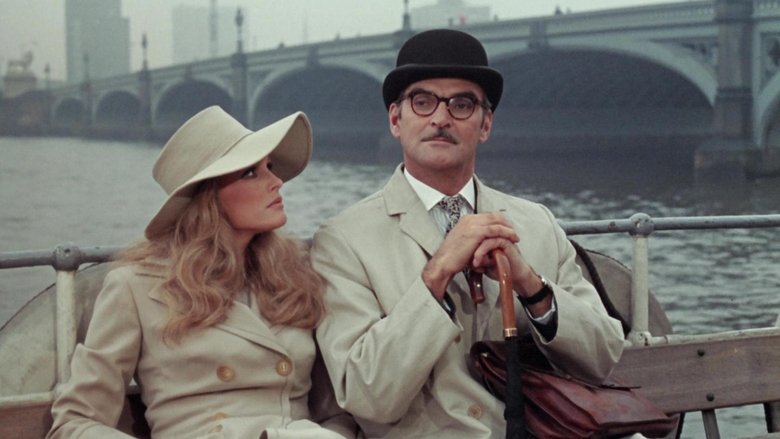
The most overtly commercial of what’s been a very odd screen directorial career, you wouldn’t guess from 1970 heist comedy
Perfect Friday that the Peter Hall behind the camera was the Sir Peter Hall who ran both the Royal Shakespeare Company and the National Theatre. A frothy sex comedy where everyone lies to each other – even the title is a lie - and Ursula Andress spends much of the picture with no clothes on, it’s an enjoyable who’s conning who? heist movie. Stanley Baker, complete with the same boring Arthur Pewty ‘tache he sported in The Games, stars as the kind of bank employee no-one suspects of any larcenous imagination because his whole life has been a monument to dullness – he even did his National Service in Hounslow, one mile from where he lives – who teams up with David Warner’s aristo (“Actually I’m extremely poor, but in a style that you’d consider luxurious.”) to rob his bank. The heist is certainly clever, allowing ample time to make a clean getaway and the film has certainly got one eye on the long view: when the subject of trusting Andress’ honesty is raised, we see Richard Nixon on TV in the background.

From the original pressbook adverts included on
Network’s Blu-ray, Gaumont British didn’t spare the hyperbole when pitching their first major picture shot at their new Shepherd’s Bush Studio, 1932’s
Rome Express, not only selling it as Grand Hotel on rails with an all-star cast but ‘one of the greatest pictures ever made.’ The stars may have faded with time but surprisingly the picture does a good job of living up to the claims thanks to a smart script by Sidney Gilliat that has hints of his later work on The Lady Vanishes and superb direction by Walter Forde that’s full of energy and visual invention. The opening sequence as the camera darts and tracks through a Paris railway station discovering and introducing some of the ensemble is a wonderfully invigorating bit of filmmaking and even when everyone’s aboard he finds ways to keep the pace from flagging through Günther Krampf’s terrifically kinetic camerawork and smart crosscutting that never feels like he’s just showing off.
On the passenger list: Esther Ralston’s movie star with a past (“One gets suspicious of old friends who know things”) and her huckster of a press agent Finlay Currie, sporting a very decent American accent (“Don’t forget, I was once press agent to Tom Mix’s horse!”); Cedric Hardwicke’s pompous businessman chasing a knighthood with big charitable donations while short-changing a waiter’s tip and begrudging his secretary Eliot Makeham eight francs for a taxi ride; Gordon Harker, looking and sounding for all the world like Lionel Jeffries in First Men in the Moon as the gossipy neighbour and golf bore who just would be on the same train as married (but not to each other) couple Harold Huth and Joan Barry; Muriel Aked’s pessimistic spinster (“I always go through life expecting the very worst. It’s so nice if it doesn’t happen”); Frank Vosper’s bug hunting French bore whose day job shakes things up; and, most importantly, Donald Calthrop’s art thief with a stolen Van Dyke in his briefcase trying to dodge his double-crossed partners in crime Hugh Williams and a banana-munching Conrad Veidt, who wants to arrange for him to take a long holiday….
Naturally almost everyone has a secret and some connection to each other, with possession of the painting and Calthrop’s increasing desperation as he jumps out of the frying pan and into the fire driving the plot as it twists and turns like a twisty turny thing with plenty of black wit: the scene where Harker assembles a poker party is a particular gem, but its constantly throwing one damn enjoyable thing after another into the mix. Everyone ends up getting what they deserve, and generally in the most entertaining way in a film that definitely deserves more of a reputation than it enjoys today.
Network’s Blu-ray comes from the BFI’s restoration, and it’s only fair to say the film doesn’t look like it was made yesterday: it looks like it was shot 80 years ago and the elements weren’t always as well looked after as they could be and needed to be pieced together from a variety of sources. But it’s equally fair to say that they’ve done a good job with what they had to work with and that this is the best it’s ever likely to look, and certainly better than it has looked for a long time despite the occasional bit of print damage (no dropped frames but some visible tears and scratches) and the odd contrast issue losing some but not all detail in a few shots, with the soundtrack pretty decently cleaned up but still offering optional subtitles (a rarity on
Network’s discs) for those lines where the early sound recording presents a problem. Aside from the still and pressbook gallery there’s also a lengthy booklet with an excellent and well-researched appreciation by Neil Sinyard that covers the making of the film and its breakthrough success in the USA. All in all it’s well worth it, especially at the budget price – a first class film for less than a second-class return train fare to London, let alone Paris to Rome!
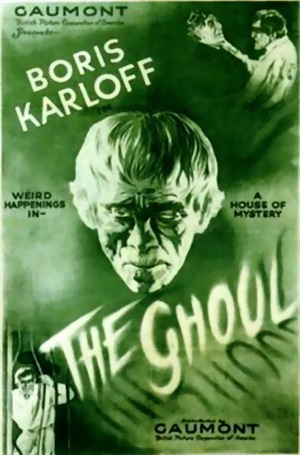
Boris Karloff’s first British film, 1933’s
The Ghoul, has long suffered from the reputation that built up around it while it was still a lost film and the disappointment that almost inevitably led to when it was rediscovered in a poor subtitled Czech print in the 70s. Since then considerably better master material has been found –
Network’s UK Region B Blu-ray looks absolutely terrific – but it’s still best looked at as an adaptation of a typical old dark house play rather than the homegrown version of the classic James Whale Universal horror films that the teaming of Karloff and Bride of Frankenstein’s Ernest Thesiger may lead you to expect. Indeed, just looking at its cast of characters tells you that in many ways it’s closer a straight-faced slight parody of the conventions of the well-made play than a real spine chiller:
- Boris Karloff, looking like the Mummy even before he rises from the grave, as the dying millionaire Egyptologist (“I put my trust in my own gods.”)
- Ernest Thesiger sporting a Scottish brogue and a club foot as his servant (“He’s set in his ways, and they are the ways of the heathen!”)
- Sir Cedric Hardwicke’s rather Dickensian crooked lawyer (“I am not a sympathetic man”)
- Anthony Bushell’s deliberately unsympathetic leading man (“No doubt you will succeed in making a painful interview intolerable”) who hates leading lady Dorothy Hyson so much you know how that’s going to end up, though curiously it does so without him showing much in the way of a softer side
- Kathleen Harrison as Dyson’s working class friend, companion and comic relief (“This is the last time I’ll ever try to make coffee in a strange house!”)
- Harold Huth’s Egyptian archaeologist out to steal Karloff’s greatest treasure only to find himself the object of Harrison’s affections (“Don’t be alarmed. We’re not quite as uncivilised as people think.” “Oh don’t say that!”)
- Ralph Richardson’s disapproving vicar (“I don’t think you people realise quite how far Morelant’s queer ideas took him.”)
Everyone is after the Eternal Light, a jewel said to grant access to the afterlife to those who truly believe and worth a fortune to those who don’t, but despite the film being widely billed as the first British horror talkie, as with most films of the era the supernatural elements are all explained away in the end, just one more reason why the film has such a low reputation among horror aficionados. But go into it with low expectations and there’s enough to like to make it worth a look. In common with many Gaumont British films of the early Thirties, it has a rather Germanic look to it – perhaps not surprising since producer Michael Balcon had often collaborated with German companies like UFA (Hitchcock even served part of his apprenticeship in Germany) and the art director was Alfred Junge (Varieté) and the cinematographer Günter Krampf (Pandora’s Box and Nosferatu). Had it been made just a year later it might even have starred some of the German players that found themselves lured onto their books and away from the uncomfortable new regime at home.
Kathleen Harrison’s comic relief is certainly better judged than Una O’Connor’s screeching in her James Whale Universal horror films, playing off against Harold Huth’s phoney Sheik act fairly effectively, though it’s debatable whether the film needed any comic relief when the pointless family feud (“As far as I can make out it was started by my late uncle as a Christmas joke”) that sets Bushell and Hyson at each other’s throats is largely played for laughs. Yet it’s not without its atmospheric moments, not least Karloff’s defiantly pagan nocturnal interment. It’s perhaps best described and enjoyed as an impressively mounted slight film: not the lost classic people hoped for, but far from the worst thing Karloff did in that era either.

1967's
Deadlier Than the Male is the kind of film that Mike Meyers must have loved growing up, reinventing Sapper's Bulldog Drummond for the swinging Sixties as a James Bond-style insurance investigator-cum-superspy in a plot filled with killer cigars, giant chessmen, female assassins and delightfully fey villainy from Nigel Green and casting one-time Bond candidate Richard Johnson in the lead. Unfortunately he's saddled with an American nephew in a futile attempt to catch a slice of the US market, while Suzanna Leigh, badly dubbed and moving with all the grace of a docker, scowl permanently in place, is hardly anybody's idea of a Bond girl. But against that there's Elke Sommer's enthusiastic sadist and light fingered nympho Sylvia Koscina offing various oil executives, the film makes swinging 60s London look great and it's as stylish as a vintage Avengers episode, offering lots of fun without ever outstaying its welcome. Plentiful extras - vintage location reports, cast and crew interviews (with Nigel Green spending more time talking about Zulu and Tobruk than the film he's promoting), stills gallery and trailer.

Reuniting Terry-Thomas and producer and former Dead End Kid Hal E. Chester from the previous year’s School for Scoundrels, 1961’s
His and Hers didn’t exactly impress critics in its day and never developed a reputation since but turns out to be an above average battle of the sexes comedy. Perhaps one reason is that the premise was out of step with its era: when author Terry-Thomas, whose exploring exploits have been stage-managed and exaggerated for years by publisher Wilfrid Hyde-White to boost sales, returns from genuinely being lost in the desert, he’s going through a chauvinist Bedouin phase (instead of sheep, he counts dancing girls to help himself sleep) that’s driving wife Janette Scott to despair. Worse, for the first time in his career he’s writing a serious book that Hyde-White refuses to publish, and he and Scott cook up a scheme to restore him to his senses by getting her to threaten writing a book of her own about what he’s really like. Matters escalate when Nicole Maurey’s photojournalist wants to collaborate with him in more ways than one, Scott sets about her task with a vengeance and they end up splitting the house into his territory and her territory, beating The War of the Roses to it by 28 years.
If it sounds a tad messy it all plays out smoothly and logically enough, with director and confirmed bachelor Brian Desmond Hurst even slipping in some broad hints that Wilfrid Hyde-White’s publisher is gay (something Terry-Thomas is blithely unaware of, unlike Scott). There’s a decent supporting cast including several Carry On veterans – Kenneths Connor and Williams (the latter pulling double duty by dubbing a reporter in an early scene), Joans Sims (wasted as Hyde-White’s secretary) and Hickson (as a distinctly unimpressed cleaning lady) - Meier Tzelniker as Alexander Korda-like film producer Felix McGregor, Oliver Reed as a beatnik poet and, if you look quickly enough, Francesca Annis.
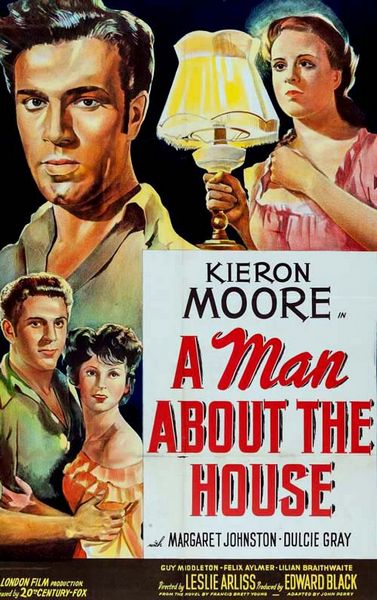 “Breakfast in bed? I’m surprised at you, Ellen. Papa would never have countenanced anything so slovenly. It is our duty as English women to set an example and not to succumb to these lax foreign ways.”
“Breakfast in bed? I’m surprised at you, Ellen. Papa would never have countenanced anything so slovenly. It is our duty as English women to set an example and not to succumb to these lax foreign ways.”
I’ll admit that I’d never even heard of 1947’s
A Man About the House until
Network released it and only picked it up on a whim, but it turns out to be a hugely enjoyable melodrama with a lot of intentional humour before things turn dark. A sort of Enchanted April meets Suspicion, it’s a surprisingly lavish production considering its unstarry cast – Australian actress Margaret Johnston in one of her few films, Dulcie Gray and Kieron Moore, given an ‘and introducing’ credit and the showiest part – but they’re more than up to the task of carrying it. The stern and upright and uptight Johnston and her mousy sister are reduced to selling the furniture to pay for coal in the small failing school in North Bromwich that their less esteemed than Johnston pretends father left them until it turns out the black sheep of the family who they were told never to even mention, Uncle Ludo, has died and left them his villa in Italy. Venturing abroad to view the property with the intent of selling it, they gradually start to loosen up and let their hair down, in no small part to the at times comically upbeat head servant Salvatore (Moore), the kind of savvy fixer with a winning way and, it later transpires, a very dodgy past. Not to mention constantly having to fire the maids because some brute has got them into trouble…
Naturally innocent spinsters aren’t safe with such a man, and even the armour of their respectability can’t save them as the black magic of the town of Torquorolla does its work. As Felix Aylmer’s local gossip, the expat heir presumptive to a minor title who came to Torquorolla for lunch and stayed for life, notes, “We northerners are very like icebergs. The greater part of our mature is submerged and invisible, and once we float into warmer waters we begin to melt, and that’s when we become a danger to navigation.” And it’s not long before Johnston is steering course for Moore even if her sister has her suspicions (“I don’t like him, Agnes. He seemed so cruel and so terribly… masculine about everything”) and she herself admits that “For a woman of my years to fall in love – it’s… it’s indecent.” For her part, Gray finds herself falling for her sister’s stick in the mud former boyfriend, Guy Middleton even though he cheerfully admits that he’s the kind of man women invariably forget despite his success (“May I congratulate you on your knighthood?” “Oh, that? Well, they had to give it to someone”) but denying herself for her sister’s sake, seemingly oblivious to the way she’s let her hair down and – the horror – undone her top button and letting a smile break through her reserve to attract Salvatore. Naturally Salvatore has his own agenda: generations ago his family held both the land and a title, and he wants it back, and if a few members of the Isit family have to suffer the after effects of his egg flips, well you can’t take a villa without breaking eggs…
Johnston’s perfect casting, blessed with the kind of sternly puritanical face that is transformed into beauty when she smiles broadly and which lets you know
exactly what she thinks of Salvatore when she tries and fails to hold back a smaller one, and it’s a question of when not if she’ll give in to her lust (“I can see you’re going to be very masterful.” “I think you like it”). Moore manages the charm and the façade of the cheekily comical foreigner that hides his true nature but he’s less successful when it comes to menace because his character is too smoothly duplicitous to reveal himself or get heavy until the finale, and there his Italian machismo is naturally no match for a decent Englishman. The darker aspects of the story tend to get lost amid the pleasing wit and beautiful scenery – it’s hinted that Uncle Ludo was a pretty decadent sort who relied on Salvatore’s past as a pimp and a blackmailer – but there’s still plenty of room for nicely staged duplicity, especially in a scene where his serenading of his ailing new wife is slowly revealed to be directed to the latest maid in the courtyard below.
It’s the kind of film that, if you like that kind of film is exactly the kind of film you’ll like, if you know what I mean. It has that mixture of the colourful and the lurid that is such a staple of romantic fiction and if it doesn’t have the gothic darkness of screenwriter-director Leslie Arliss’ Gainsborough bodice-rippers like The Man in Gray it’s still a lot more entertaining than it probably has any right to be. No extras other than an image gallery but the disc does boast a very impressive transfer with no obvious signs of damage to the source.































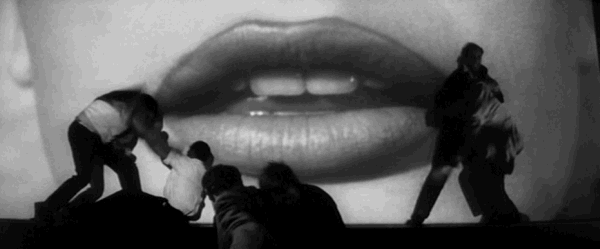




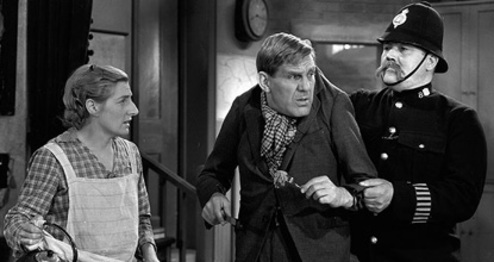
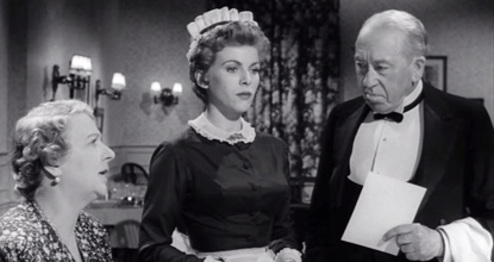




 Linear Mode
Linear Mode

